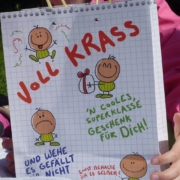8 curiosities about German which reveal its peculiar beauty
Almost all those who approached the study of the German language questioned at a certain point whether it was the right choice.
Not because learning German is useless, quite the opposite, but because the effort that this language requires to be truly assimilated by those who study it is remarkable. The complications that arise when reaching an intermediate level might question the importance that German learning has for us. At this point only a great passion or the need for study and work reasons could help address the superhuman effort required to conduct a conversation or to comprehend a complex text in German. Still, it is undeniable that German has a certain concealed beauty, a romantic soul that makes it awesome and wonderful at the same time. We put together a list of curiosities about German that might seem incomprehensible at first, and that actually reveal its peculiar beauty.
1. The multiple meanings of bitte
Whereas in English, in particular in Britain but not only, there are countless ways to thank someone and to tell them that they are welcome (to mention a few, “Don’t mention it!”, “No worries!” or “My pleasure”), in German the choice is narrowed. By employing bitte we can in fact say all of the above! Moreover the expression ja bitte! means “tell me!”. And if we haven’t understood something we could ask for clarifications by asking wie bitte?
2. The declination of the articles
For those who have studied Latin or Greek, or speak Slavic languages like Russian, cases and declinations aren’t too much of a suffering. For those coming from languages like English and Italian, it is a different matter. In German the cases are nominative, accusative, dative and genitive. It is crucial to be able to recognize the ends of the articles in different cases because they allow you to reconstruct the sense of the sentence. It is worth taking a small effort initially so to better address subsequent language challenges.
3. The sound of German
At first German might sound a bit hostile due to the sounds that are so different from other European languages as French, Italian or English. However the sound of German varies a lot concurring to the tone in which the words are pronounced. In this video, for example, you can notice how the German can be surprisingly harmonious!
4. Also the most common verbs are difficult
Let’s take an example of a frequent verb such as “to put”. In English we wouldn’t notice the construction of the sentence, but German requires to be more precise: the verbal voice to “put something horizontal” is not the same as “putting something upright”. In this case, German has two different verbs: they are called verbs of position and the most used are stehen / stellen (stand upright / put upright), liegen / legen (lying in horizontal position / put in horizontal position) , sitzen / setzen (sitting / setting) and hängen, that means both “hanging” if static, and “hang” if in movement. It is true that all these differentiations can represent for many reasons discomfort, but the logic of German is certainly an advantage to raise awareness of the idiom itself.
5. Gender is a delicate matter
Unlike our universal ‘the’, German has a peculiar assignation of gender. In this language, which includes also the ‘neutral’ gender, learning the rules that allow us to identify the most common desinance of the three genders might be useful to clear some doubts, but in reality the only way to truly learn the gender is by learning the words by heart. The mnemonic study is a method that today many despise and disagree with, in particular young people, because the learning abilities are limited. On the other hand, returning more than a hundred times to the dictionary to control the gender of a noun can be really frustrating and undermine the understanding of the text. To remedy this problem, there is no other cure to exercise this muscle, as Umberto Eco advised: German can therefore be an excuse to train the ability to remember and ward off the ability to become google-dependent.
7. Endless words
With its 79 letters Donaudampfschiffahrtselektrizitätenhauptbetriebswerkbauunterbeamtengesellschaft is the longest word recorded in the German vocabulary and indicates the association of subordinate officers of the Danube steam company’s electrical services department. It is not an isolated case because there are other very long words, formed by the association of different terms, which might be absolutely terrifying at first but at a second glance actually reveal their inner logic. Recognizing the terms that make up the composite words and singing them separately allows us to better understand what we are saying and not lose our breath by uttering meaningless sounds!
8. English and German
English, as so has French, have strongly influenced the language and to this day English speakers hold an advantage towards the language. Finger for instance means finger also in German as so does stinken mean to stink. Not to assume however that all English words can be translated in German! There are several ambiguous words which however will surely remain stuck in your mind.
Cover photo: screenshot from Youtube
































